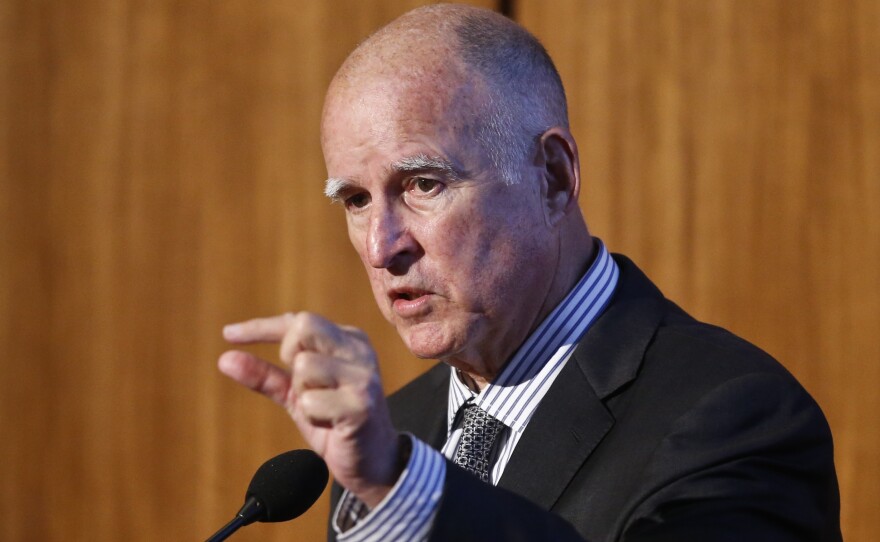The governor of California has given in to liberal lawmakers who want to repeal a welfare policy that critics call racist, ineffective and harmful to the state's poorest children.
As part of a pending state budget deal with fellow Democrats, Gov. Jerry Brown has agreed to repeal the so-called maximum family grant policy that prohibits people from receiving increased welfare income if they have more children while receiving public assistance. The change would cost the state about $220 million a year.
With legislative approval of the budget expected this week, California would become the seventh state to repeal the policy that was once enforced by 22 states.
RELATED: City Council Approves Budget, Employee Contracts
Brown has resisted changing the policy for years amid his resistance to long-term spending obligations.
Critics of repeal say increasing welfare benefits won't resolve underlying problems involving education and employment that keep people in poverty.
"It is not the universal answer to poverty alleviation, but it is the most significant step we've taken of late to address the needs of those living in deep poverty across the state," said state Sen. Holly Mitchell, D-Los Angeles, who spearheaded the four-year effort to repeal maximum family grants.
During a wave of welfare crackdowns in the 1990s, California and other states capped benefits for families. In California, children were not eligible for cash assistance if any member of the household had been receiving aid 10 months before birth.
Parents could appeal for assistance if the child was conceived from rape or incest reported to authorities, or from the failure of certain types of birth control.
Mitchell said the policy was rooted in the stereotype of African-American "welfare queens" having babies to boost state aid checks. But she and others fighting poverty point to a report by the U.S. Government Accountability Office that welfare caps have no impact on birth rates, and others showing the lack of money instead harms children's health and traps them in poverty.
"For more than 20 years, California's maximum family grant rule has assaulted the dignity of women's rights and left hundreds of thousands of our state's children in abject poverty," Senate President Pro Tem Kevin de Leon, D-Los Angeles, said in a statement after the state budget deal was announced.
Mary Theroux, senior vice president at the conservative Independent Institute in Oakland, said she'd prefer to see the Legislature find ways to improve education and job opportunities for poor people. She cites research suggesting women who lack economic opportunities see no reason to delay motherhood.
"Sure, they can keep handing out money for additional children, but it's not really helping children and it isn't helping families," Theroux said. "It's like giving somebody with cancer an aspirin."
If lawmakers sign off as expected on the $122 billion state budget package, California would join Minnesota, Oklahoma, Wyoming, Nebraska, Illinois and Maryland in repealing the welfare cap, according to the Western Center on Law and Poverty.
The repeal in California would benefit about 126,000 children in 93,000 families, according to the California Department of Social Services, which administers the CalWORKs program.
Most families would receive an additional $138 a month for each child, the agency estimated.
Vivian Thorp, 50, a legal aid advocate in Oakland who received CalWORKs assistance between 1999 and 2011, said no one should have to make a "Sophie's Choice," a reference to a novel and film about a mother having to choose between her children in World War II.
"Who's going to get diapers this month? Who's going to get shoes this month? Who's going to get a jacket this month? And who's going to wait?" Thorp said.
Thorp was subject to the family cap when she had the youngest of her three daughters. Her struggle to afford diapers, food and transportation significantly extended her schooling and made it harder to become self-sufficient, she said.
At times, she said, she resorted to stealing diapers and lived for nearly four years in a decrepit abandoned building.
"I still continued to go forward, and it just took a lot longer not having money," Thorp said.
The political breakthrough on the issue came when proponents addressed the governor's financial concerns by finding a way to pay for the change without long-term reliance on the state's general fund. That fund will be tapped in the short term, but the cost will eventually be covered through an account that pays for annual inflation increases for welfare benefits.
"It's a creative approach to financing it," said H.D. Palmer, spokesman for the state Department of Finance.






